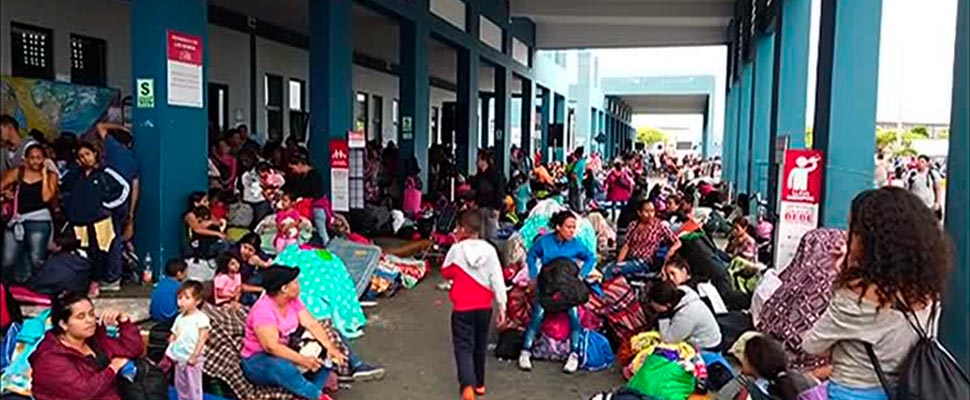Opinion: Venezuelans, Not Migrants, Refugees
Venezuelan refugees fleeing hunger and dictatorship are being rejected by governments and the Latino population.

On International Refugee Day, the world witnesses various migratory crises caused by natural disasters, wars or dictatorships. Photo: Reuters
LatinAmerican Post | Santiago Gómez Hernández
Listen to this article
Leer en español: Opinión: Venezolanos en América Latina son refugiados, no migrantes
On International Refugee Day, the world witnesses various migratory crises caused by natural disasters, wars, or dictatorships. Latin America is currently the epicenter of the worst migratory movement in our history, Venezuelan migrants fleeing the Chavista dictatorship that has brought misery, hunger, and insecurity. But here the migratory language perhaps makes us think that Venezuelans arrive because they got tired of their beaches and the heat and that is why they took their way to other latitudes. No, here we are seeing millions of refugees from hunger and dictatorship, it is nothing more, nothing less.
Several sister countries have humanely welcomed several of these millions of refugees. However, the rejection, discrimination, and xenophobia seem increasingly blatant. In recent months we have seen political campaigns in which they blame Venezuelans for bringing crime to our countries as if we used to be an imitation of Nordic countries where living was simple.
"Yo no me imaginé que hubiera tanta gente saliendo del país". – Isbel
Escucha más historias de refugiados y migrantes venezolanos en esta lista de reproducción de Spotify @CanadaDev #JuntosXLosVenezolanos.
— UNICEF Latin America (@uniceflac) June 15, 2021
The same pandemic, which hit the world so hard, was also much more damaging to the most vulnerable sectors, including migrant Venezuelans. In Colombia, where the majority of Venezuelans work in the informal sector, COVID-19 barely arrived and quarantine measures began to be decreed, those who at the time arrived walking to the country had to leave in the same way. Their condition of poverty, informality (living from day to day), not having family networks, living on rent, and with less access to government support, left them adrift, without aid, and with the only alternative of looking for a little. of aid in his already damaged country where President Maduro received them calling them "chemical weapons sent from Bogotá."
Not long ago, the mayor of Bogotá, Claudia López, leader of the center-left Green Party and who maintains a progressive discourse, criticized Venezuelans, insinuating that crime in the city has increased since the arrival of the migratory wave. However, official figures do not support this discourse, since, despite the fact that there are indeed migrants who commit crimes, the percentage is negligible compared to other populations.
Another clear example of this "progressivism" is in Peru, where, in addition to having one of the campaigns with the greatest xenophobic discourse in history, the "elected president" (whose victory has not yet been defined), Pedro Castillo, affirmed that the Migrants who comment on criminal acts have 72 hours to leave the country. Again, it is a speech that tries to blame a typical phenomenon of Latin American cities with roots in inequality on Venezuelan migrants. If it is true that there are immigrants who commit crimes, they should be prosecuted, but not speeches that what they do is reinforce discrimination against a vulnerable population.
But the strangest thing is that discrimination is not just political discourse. In addition to hundreds of videos where the discriminatory, xenophobic and violent treatment of Venezuelans is evidenced, several cases of physical attacks are also seen. Recently a young Venezuelan was beaten while working in a supermarket in Argentina.
Also read: Infographic: Is Duque's Police Reform Enough For Colombian Protesters?
So, today, to celebrate Refugee Day, it would be appropriate for all Latinos to be aware that Venezuelan migration is a humanitarian and migratory crisis. First, it should be insisted as a block so that international organizations provide necessary help for migrants, either at the borders with Colombia or Brazil, but also so that they can have support as soon as they reach their final destination.
Trabajador venezolano en Argentina fue golpeado en su trabajo #14Jun https://t.co/6Qchw0pbn8
— NTN24 Venezuela (@NTN24ve) June 15, 2021
Any type of legal measure that attempts to prevent or hinder the reception of refugees should also be rejected. The path that Colombia has chosen is the one indicated. President Iván Duque has already promised that he will regularize the stay of Venezuelans in Colombia. Additionally, no type of legal or physical barrier has been imposed for the arrival of migrants (except for border closures for political or health issues). The arrival and reception of Venezuelan refugees must be a priority issue throughout the continent and we must be aware that this is a humanitarian need. Additionally, it is time that as a bloc, we also ask UNHCR and the UN for increased resources and logistical support. If the United States maintains its blockades on Venezuela as a measure to pressure a democratic change in the country, it must also be aware that this increases the migratory flow throughout the region and therefore, it should increase economic collaboration for the governments that have more refugees. are receiving.




